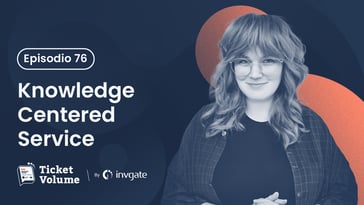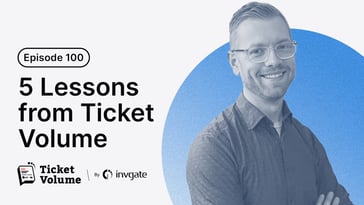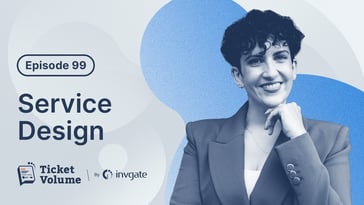Change is happening faster than ever before, and organizations need to be equipped to handle it. But also the need to be open to feedback and willing to change direction if necessary, rather than stubbornly pushing forward without considering the potential consequences.
That's where the Organizational Change Management (OCM) framework comes in, to allow informed decision-making process, where adjustments or adaptations can be made to address the concerns and ensure a smoother transition.
On the 61st Episode of Ticket Volume, our IT podcast, Karen Ferris took us on an exhilarating journey through the OCM framework, shedding light on the ever-evolving landscape of change. They delve into the OCM framework, dissect its core principles, and discover how it can be applied to navigate the turbulent waters of organizational change.
Karen is an Independent Organizational Change Management and Leadership Guide, and a Service Management Expert at Macanta Consulting. She's also a published author, having written books on Organizational Change and workplace resilience. With her wealth of experience, Karen will be our guide as we explore the OCM process and learn valuable tips for successful Change Management.
So, if you're ready to gain valuable insights into the world of OCM and learn how to navigate change with ease, be sure to catch the full episode featuring Ferris.
And don't forget, you have the opportunity to join our monthly live recordings, where you can ask your questions directly during the session. Don't miss out on this valuable opportunity to learn from industry experts.

Organizational Change Management process
Ferris's journey into OCM began when she shifted her focus from Service Management to embedding sustainability into organizations. This transition led her to write a widely acclaimed book on OCM, which resonated strongly within the service management community.
One crucial aspect of OCM is training. Ferris emphasizes the significance of equipping individuals with the necessary skills to embrace new ways of working. Collaboration between OCM and learning and development specialists is key in identifying training needs and tailoring delivery methods to suit individual preferences. Effective training not only alleviates concerns and anxiety surrounding change but also empowers employees to embrace new challenges and avoid resistance.
If you want to learn a bit more about training in IT, check out episode 33, where Lisa Schwartz came on to speak about training vs. learning in IT and provided valuable insights on the subject.
Driving change within organizations requires strategic planning and effective communication. Ferris suggested conducting workshops with key stakeholders to identify necessary changes and assess their impact. It is vital to evaluate available resources and expertise to determine the feasibility of implementing new practices. Additionally, leaders must employ innovative and engaging communication methods to effectively convey important information.
The impact of remote work on organizational change
The advent of remote work has significantly impacted organizational change and further emphasizes the need for effective communication. Ferris emphasized the value of leaders initiating conversations and actively listening to employees' preferences and feedback.
The pandemic has brought about massive organizational change, necessitating the embrace of remote and hybrid work. Leaders must shift their mindset and focus on purpose and outcomes rather than physical presence. And so, OCM experts must adapt to this new work environment and prioritize effective communication and collaboration.
|
|
"Change is like a wave, and it's a massive wave. Some are bigger than others, but they'll knock you over if you stand still. It'll take you with it, and you'll go under. And when you try to come up for air and get back on your feet, the next wave comes crashing over you. So, we need to find ways to ride the waves of change. It's about being prepared for it, and that's where Organizational Change Management comes in. OCM needs to fundamentally change the way we prepare people for the next change." Karren Ferris |
The reality is that traditional Change Management frameworks are no longer sufficient in today's ever-evolving landscape. Change is constant, and organizations must be prepared for future disruptions. This calls for agile Change Management and a focus on leadership development. It involves embracing a mindset of adaptability and flexibility, allowing organizations to respond quickly and effectively to changing circumstances. Agile change management recognizes that change is not a linear process but rather a continuous journey of learning and adaptation.
Farris expressed many leaders lack the necessary skills to tackle today's challenges. Hence, leadership development programs can equip them with the tools and knowledge to lead effectively in times of change.
But, leadership development goes beyond simply acquiring technical skills. For that reason embarking on the leadership journey requires a shift from the traditional command and control approach.
Ferris encouraged leaders to focus on mentoring, supporting, coaching, and developing themselves and others. But most importantly, to start a conversation instead just communicating one-way. She said we often talk about communication, but it's important to shift our perspective and think of it as a conversation. It should be an invitation for leaders to respond, to check if the team understood the message as intended, and to ask questions or challenge what is being communicated.
|
|
"What leaders need to start with is the 'why' and not forget that. Don't assume everybody's on the same page and assume that everybody knows what you know. And then listen to what they're saying because if you started with why, that's the justification, clear justification for the need for the change. And then you encounter resistance, that resistance could be a good thing. You need to listen to it because it could be that you're doing the wrong thing or it could be that the message you're sending out isn't clear enough." Karren Ferris |
And she said it best: becoming a better leader is a continuous journey filled with milestones, setbacks, and ongoing learning. So, moving forward, here is her advice:
- Embrace change
- Provide effective training
- Drive strategic change initiatives
- Prioritize communication
- Invest in leadership development
Bottom line
This is just a summary of Ticket Volume's episode featuring Karen Ferris. Be sure to listen to the full discussion with Matt Beran to learn more about the Organizational Change Management process and how to apply its core principles to real-world situations.
You can find the full episode on popular platforms like Apple Podcasts, Spotify, YouTube, or any other podcast platform you prefer. Remember to subscribe if you're interested in joining the monthly live recordings!















